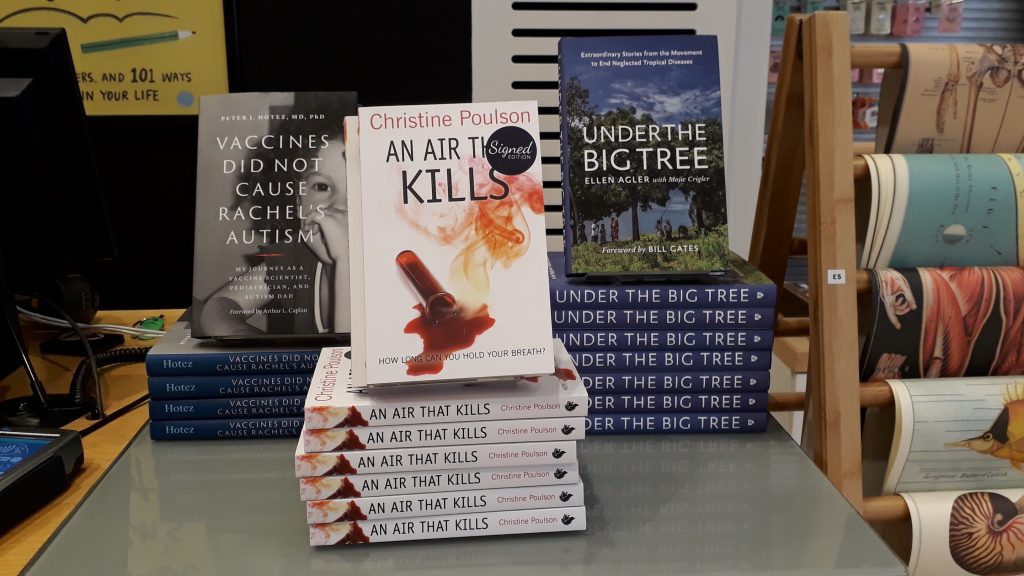Unexpected pleasures
 Something I could never have imagined when I started writing fiction was that I would one day find myself on a panel at the Festival of the International Society of Neglected Tropical Diseases. But so it was yesterday at the Wellcome Institute when I joined Mojie Crigler, the co-author of Under the Big Tree: Neglected Stories from the Movement to End Neglected Tropical Diseases and Professor Peter Hotez of Baylor College of Medicine, author of Vaccines Did Not Cause Rachel’s Autism (larger than life in every sense – he joined us by Skype from Houston, Texas). The session, on writing about disease, was very able chaired by Marianne Comparet, one of the organisers of the festival. I’d been invited because my latest book, An Air That Kills, has a story-line involving research into malaria (and murder by mosquito!). The question of how scientists can make medical issues accessible to the genuine public is a timely one and we had a stimulating discussion.
Something I could never have imagined when I started writing fiction was that I would one day find myself on a panel at the Festival of the International Society of Neglected Tropical Diseases. But so it was yesterday at the Wellcome Institute when I joined Mojie Crigler, the co-author of Under the Big Tree: Neglected Stories from the Movement to End Neglected Tropical Diseases and Professor Peter Hotez of Baylor College of Medicine, author of Vaccines Did Not Cause Rachel’s Autism (larger than life in every sense – he joined us by Skype from Houston, Texas). The session, on writing about disease, was very able chaired by Marianne Comparet, one of the organisers of the festival. I’d been invited because my latest book, An Air That Kills, has a story-line involving research into malaria (and murder by mosquito!). The question of how scientists can make medical issues accessible to the genuine public is a timely one and we had a stimulating discussion.
The festival was a fantastic event and I met interesting people. It was held at the Wellcome Collection, is one of my favourite places in London. It has some great free exhibitions – there was one on forensics a few years ago – plus a nice cafe and an excellent shop. It was lovely to see my book and those of my fellow panelists on display there.
A coda: there are some brilliant researchers working on malaria, but it is still causes the death of half a million people a year, mostly in sub-Saharan Africa. A child dies of malaria every thirty seconds. I didn’t know that until I wrote this book. But now that I do know, I support a charity, the Against Malaria Foundation, http://againstmalaria.comwhich provides bed nets impregnated with insecticide to people at risk.
2 Comments
Margot Kinberg
March 4, 2020What a fascinating panel! I wish I could have been there to hear what all of you had to say! It sounds as though it went well and the discussion was rich. I’m very happy for you that it was such a positive experience.
Christine Poulson
March 4, 2020Thanks, Margot! I was a bit nervous as a non-scientist writing about science, but they couldn’t have been nicer.